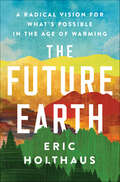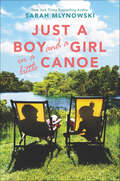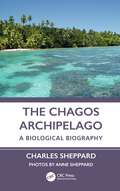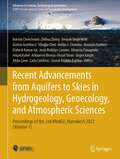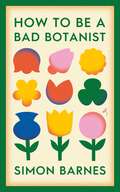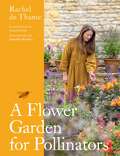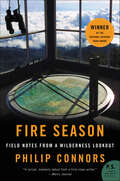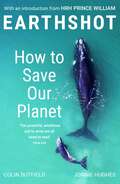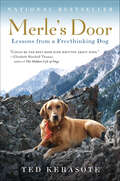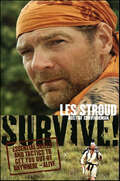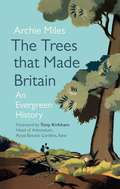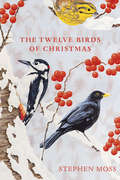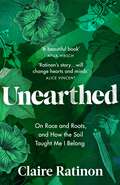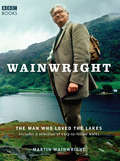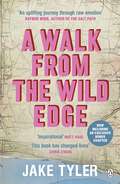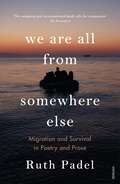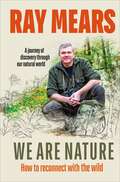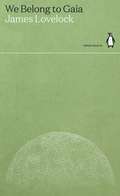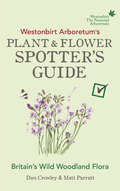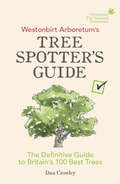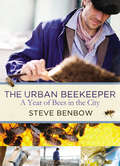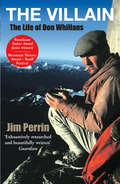- Table View
- List View
The Future Earth: A Radical Vision for What's Possible in the Age of Warming
by Eric HolthausThe first hopeful book about climate change, The Future Earth shows readers how to reverse the short- and long-term effects of climate change over the next three decades.The basics of climate science are easy. We know it is entirely human-caused. Which means its solutions will be similarly human-led. In The Future Earth, leading climate change advocate and weather-related journalist Eric Holthaus (“the Rebel Nerd of Meteorology”—Rolling Stone) offers a radical vision of our future, specifically how to reverse the short- and long-term effects of climate change over the next three decades. Anchored by world-class reporting, interviews with futurists, climatologists, biologists, economists, and climate change activists, it shows what the world could look like if we implemented radical solutions on the scale of the crises we face. What could happen if we reduced carbon emissions by 50 percent in the next decade?What could living in a city look like in 2030?How could the world operate in 2040, if the proposed Green New Deal created a 100 percent net carbon-free economy in the United States?This is the book for anyone who feels overwhelmed by the current state of our environment. Hopeful and prophetic, The Future Earth invites us to imagine how we can reverse the effects of climate change in our own lifetime and encourages us to enter a deeper relationship with the earth as conscientious stewards and to re-affirm our commitment to one another in our shared humanity.
Marine Otter Conservation
by Liliana Ayala Raúl Sánchez-Scaglioni Gonzalo Medina-VogelThis book offers a multidisciplinary approach to conservation issues related to the marine otter (Lontra felina). The main goal is the systematization of different research efforts on this species, to contribute with conservation policy design and implementation. The authors contribute their achievements in conservation, ecology, status in freshwater habitats, habitat fragmentation effects, interaction with human activities and recommendations for an effective conservation of the species. The book is directed first and foremost towards researchers and authorities and people involved in conservation tasks of otters.Despite in the last decades some studies and efforts on Lontra felina has carried in Peru and Chile, some information can be gathered to fill the gaps on marine otter conservation in Peru. That is the main goal of the book Conservation of Marine Otter. Moreover, the publication will be the first book published at international level on Lontra felina with the participation of several experimented researchers on this threatened and endemic species.
Just a Boy and a Girl in a Little Canoe
by Sarah MlynowskiPerfect for fans of 99 Days and Anna and the French Kiss, this unforgettable, sun-drenched summer romance from one of YA’s bestselling and most beloved authors, Sarah Mlynowski, is an irresistible dive into the joys of seizing the day and embracing the unexpected.Sam’s summer isn’t off to a great start. Her boyfriend, Eli, ditched her for a European backpacking trip, and now she’s a counselor at Camp Blue Springs: the summer camp her eleven-year-old self swore never to return to. Sam expects the next seven weeks to be a total disaster.That is, until she meets Gavin, the camp’s sailing instructor, who turns her expectations upside down. Gavin may have gotten the job just for his abs. Or that smile. Or the way he fills Sam’s free time with thrilling encounters—swimming under a cascade of stars, whispering secrets over s’mores, embarking on one (very precarious) canoe ride after dark.It’s absurd. After all, Sam loves Eli. But one totally absurd, completely off-the-wall summer may be just what Sam needs. And maybe, just maybe, it will teach her something about what she really wants.
The Chagos Archipelago: A Biological Biography
by Charles SheppardThis book is the story of the natural history of Chagos Archipelago, and of the efforts of many to get it recognized as an important and protected wildlife reserve. Exploring its immense natural riches and biodiversity, both on islands and in the marine environment, this book addresses competing claims to its resources, its politics, and the desire of some commercial and political parties to exploit the area. It is about the fight to conserve a wonderland of biodiversity and obtain its protection from exploitation, especially of its reefs and other marine life. This book shows the importance of the Chagos Archipelago and why so much research was done there. Rather than being a typical research book, this work presents research in a narrative form and describes the now substantial Government, UN, and legal interest in the archipelago since the UK was told to ‘decolonise’ it. It is also the story of our planet in miniature: the archipelago encapsulates much of the world’s conservation tribulations in a way we can much more easily understand. This narrative will explore the difficulties faced by the Chagos Archipelago, including displaced people, old and derelict industries (coconut in this case), the military, politics, rich and untouched ecosystems that some want to exploit, ruined habitats on land, climate change, and territorial claims. It will examine how all of these factors have affected the natural history, biodiversity, and conservation of the archipelago. With beautiful photography of the Chagos Archipelago coral reefs and islands, as well as graphs indicating their findings, this book offers professionals, researchers, academics, and students in conservation and biodiversity an insight into one of the world’s most diverse ecosystems. It is also accessible for non‑academic readers with an interest in climate change, biodiversity, and the importance of conservation.
Recent Advancements from Aquifers to Skies in Hydrogeology, Geoecology, and Atmospheric Sciences: Proceedings of the 2nd MedGU, Marrakesh 2022 (Volume 1) (Advances in Science, Technology & Innovation)
by Haroun Chenchouni Zhihua Zhang Deepak Singh Bisht Matteo Gentilucci Mingjie Chen Helder I. Chaminé Maurizio Barbieri Mahesh Kumar Jat Jesús Rodrigo-Comino Dionysia Panagoulia Amjad Kallel Arkoprovo Biswas Veysel Turan Jasper Knight Attila Çiner Carla Candeias Zeynal Abiddin ErgülerThis book is based on the accepted papers for presentation at the 2nd MedGU Annual Meeting, Marrakesh 2022. It presents a series of newest research studies that are nowadays relevant mainly to Middle East, Mediterranean region, and Africa. It includes major subjects related to hydrology, hydrogeology, hydrogeochemistry including, but not limited to, isotope hydrology, groundwater models, water resources and systems, and related subjects. It also includes research studies on biogeochemistry which mainly focus on the interactions between life and the chemical cycles in the Earth system. Some case studies on geobiology and geoecology investigate the structure and function of geoecosystems, their components, and their environment. The book also presents major subjects related to atmospheric, oceanic, meteorology and climatic science with recent developments in the field. By cutting across these traditional subject boundaries, this book brings together the major elements that are important for understanding the weather, climate, water systems, and geoecosystems in these regions.
How to be a Bad Botanist
by Simon BarnesCan you tell a tomato from a grape? Lawn from an oak tree? Then congratulations - you are a botanist. Self-confessed bad birdwatcher Simon Barnes thought he knew nothing about plants. He didn't object to them: trees are interesting, because birds perch in them; plants are useful as they create habitats and birds live in habitats. But while admiring the tenacity of some sea kale and yellow-horned poppy to thrive on an inhospitable shingle beach, he was struck by a truth - it all begins with plants. In this funny and inspiring book, Simon Barnes tells the story of a lifelong relationship with plants, and the realisation of the fact. Taking us from thinking ourselves ignorant about plants, to gently starting to observe seasons, patterns and places, Barnes guides us on a journey to better observing the beauty and diversity of the natural world. Both a primer on how to appreciate the plants around us and an exploration on how they make our external and interior worlds, How to be a Bad Botanist opens our eyes to the wonders around us. Plants are everywhere, in every part of your life, and you know more than you think.
A Flower Garden for Pollinators: Learn how to sustain and support nature with this practical planting guide
by Rachel de ThameThe perfect guide for any gardener looking for inspiration on how to create a pollinator-friendly garden all year round.Pollinators are essential to life on Earth. Yet bees, butterflies and other beneficial insects are struggling due to climate change and habit loss. Fortunately, what we choose to plant in our gardens can help them to thrive. In this heartfelt guide, horticulturalist and Gardener's World presenter Rachel de Thame highlights plants we can grow that are rich in nectar and pollen, ensuring the garden is filled with beautiful flowers for us all to enjoy year-round.Arranged by season and illustrated with exquisite hand-painted watercolours and glorious photography showcasing many of Rachel's favourite plants, this book provides a captivating look at how best to support nature. Whether you have a small urban courtyard or a large country garden, A Flower Garden for Pollinators will guide your choice of plants, attracting a host of pollinators to your own patch of paradise.'A wonderful journey through the magical world of plants.' - Frances Tophill
A Flower Garden for Pollinators: Learn how to sustain and support nature with this practical planting guide
by Rachel de ThameThe perfect guide for any gardener looking for inspiration on how to create a pollinator-friendly garden all year round.Pollinators are essential to life on Earth. Yet bees, butterflies and other beneficial insects are struggling due to climate change and habit loss. Fortunately, what we choose to plant in our gardens can help them to thrive. In this heartfelt guide, horticulturalist and Gardener's World presenter Rachel de Thame highlights plants we can grow that are rich in nectar and pollen, ensuring the garden is filled with beautiful flowers for us all to enjoy year-round.Arranged by season and illustrated with exquisite hand-painted watercolours and glorious photography showcasing many of Rachel's favourite plants, this book provides a captivating look at how best to support nature. Whether you have a small urban courtyard or a large country garden, A Flower Garden for Pollinators will guide your choice of plants, attracting a host of pollinators to your own patch of paradise.'A wonderful journey through the magical world of plants.' - Frances Tophill
Fire Season: Field Notes from a Wilderness Lookout
by Philip Connors“Fire Season both evokes and honors the great hermit celebrants of nature, from Dillard to Kerouac to Thoreau—and I loved it.”—J.R. Moehringer, author of The Tender Bar“[Connors’s] adventures in radical solitude make for profoundly absorbing, restorative reading.”—Walter Kirn, author of Up in the AirPhillip Connors is a major new voice in American nonfiction, and his remarkable debut, Fire Season, is destined to become a modern classic. An absorbing chronicle of the days and nights of one of the last fire lookouts in the American West, Fire Season is a marvel of a book, as rugged and soulful as Matthew Crawford’s bestselling Shop Class as Soulcraft, and it immediately places Connors in the august company of Edward Abbey, Annie Dillard, Aldo Leopold, Barry Lopez, and others in the respected fraternity of hard-boiled nature writers.
Earthshot: How to Save Our Planet
by Colin Butfield Jonnie HughesThe Earthshot concept is simple: Urgency + Optimism = Action. We have ten years to turn the tide on the environmental crisis, but we need the world's best solutions and one shared goal - to save our planet.It's not too late, but we need collective action now. The Earthshots are unifying, ambitious goals for our planet which, if achieved by 2030, will improve life for all of us, for the rest of life on Earth, and for generations to come.They are to:· Protect and Restore Nature· Clean our Air· Revive our Oceans· Build a Waste-Free World· Fix our ClimateEARTHSHOT: HOW TO SAVE OUR PLANET is the first definitive book about how these goals can tackle the environmental crisis, from rainforests to coral reefs, via wilderness, cities and in our own homes. It is a critical contribution to the most important story of the decade.
Merle's Door: Lessons from a Freethinking Dog
by Ted KerasoteWhile on a camping trip, Ted Kerasote met a dog—a Labrador mix—who was living on his own in the wild. They became attached to each other, and Kerasote decided to name the dog Merle and bring him home. There, he realized that Merle’s native intelligence would be diminished by living exclusively in the human world. He put a dog door in his house so Merle could live both outside and in. A deeply touching portrait of a remarkable dog and his relationship with the author, Merle’s Door explores the issues that all animals and their human companions face as their lives intertwine, bringing to bear the latest research into animal consciousness and behavior as well as insights into the origins and evolution of the human-dog partnership. Merle showed Kerasote how dogs might live if they were allowed to make more of their own decisions, and Kerasote suggests how these lessons can be applied universally.
Survive!: Essential Skills and Tactics to Get You Out of Anywhere—Alive
by Les StroudAn up-to-the-minute survival guide from the creator of Survivorman explores how to stay alive in the wild, in the jungle, in the desert, and in urban disasters.From the sun-scorched sands of the Kalahari to the snake-infested jungles of the Amazon, Les Stroud has made a life of surviving in the harshest—and most remote—regions on Earth.Now, the creator, producer, and host of the hit television program Survivorman transfers his decades of knowledge and experience to the pages of Survive!, a practical guide that gives everyday readers a no-nonsense look at the real world of survival.Stroud offers readers the essential skills and tactics necessary to endure in any corner of the globe, along with a wealth of insider information born of his own experiences in the outdoors and unavailable in any other book. Readers will learn:How to make a survival shelter and why a lean-to is largely a waste of time.Why survival kits are important, and why you should make your own.Where to find water and why drinking contaminated water is sometimes warranted.How to locate and trap small animals and why the notion of tracking and hunting large game is largely a pipe dream.Whether seasoned in the outdoor arts or new to adventuring, all readers will learn something from Survive!. Stroud's many colorful anecdotes and cut-to-the-chase philosophy not only make for an entertaining read, but also enhance anyone's ability to focus on the main goal when everything else has gone wrong—survival.
The Trees that Made Britain: Revised Edition
by Archie MilesAs the oldest living inhabitants on the planet, trees have played a major part in the way we live today, providing both the daily oxygen we breathe and the foundation of our nations heritage. Every native tree in Britain, whether its part of a grand avenue, a thriving hedgerow, an ancient wood or a colourful orchard, tells a different story. The Trees That Made Britain takes us on a journey of discovery to every corner of the nation. Through detailed portraits of individual tree species, author and photographer Archie Miles reveals the stories of the trees that have influenced the culture, myths and fabric of the nation. The book is full of surprising facts on how trees have been used by man over the centuries, from the oak used in the building of HMS Victory to ancient longbows made from yew, as well as practical advice on visiting some of Britains finest living examples. The combination of rich historical material and lyrical descriptions captures the essence of our native tree species.
The Twelve Birds of Christmas
by Stephen MossNaturalist Stephen Moss digs beneath the surface of some of our most popular Christmas carols in an ornithological celebration of the Festive Season.Using the structure of the carol as a jumping off point, he explores the place of twelve fascinating British birds in our history, culture and landscape. Some of the birds are obvious, there's the swan and of course the partridge. Other chapters are loose interpretations of a verse: for drummers drumming he delves into the woodpecker's distinctive drumming tap. Woodpeckers, he explains, have special padded skulls to mitigate against using its head like hammer drills. They carefully select dead trees for the most hollow, sonorous sound.With brilliant anecdotes and insights, Stephen Moss weaves history, culture, bird behaviour and folklore into a compelling narrative for each species, tracing its fortunes over the past two centuries.'A superb naturalist and writer' Chris Packham author of Finger in the Sparkle Jar'Moss has carved out an enviable niche as a chronicler of the natural world' Daily Mail
Unearthed: On race and roots, and how the soil taught me I belong
by Claire RatinonA powerful work of memoir and storytelling that will change the way we think about the natural world.Like many diasporic people of colour, Claire Ratinon grew up feeling cut off from the natural world. She lived in cities, reluctant to be outdoors and stuck with the belief that success and status could fill the space where belonging was absent. But a chance encounter with a rooftop farm was the start of a journey that caused her to rethink the life she'd been creating and her beliefs about who she ought to be. Enlivened, she turned her hand to growing food in London before finding herself yearning for a small parcel of land to call her own. Unearthed tells the story of her leaving the city for the English countryside - and her first garden - in the hope of forging a pathway towards the embrace of the natural world and a sense of belonging cultivated on her own terms.'Ratinon's story will change hearts and minds' Alice Vincent'A beautiful book about nature...I recommend it' Afua Hirsch, author of Brit(ish)
Wainwright: The Man Who Loved the Lakes
by Martin WainwrightWainwright: The Man Who Loved the Lakes is a celebration of the British landscape, and it tells the remarkable story of Alfred Wainwright who in 1952 decided to hand draw a series of guides to the fells of Lakeland. For the next 13 years he spent every weekend walking, and every weekday evening drawing and writing - completing one page per night. The result was Wainwright's Pictorial Guides to the Lakeland Fells. Although initially self published they have now sold over a million copies and are still popular and much loved today. He went on to present a series of TV shows on the BBC about walking in the Lake District that made him even better known. He was an unlikely celebrity, he preferred his own company and thought walking in the countryside should be a solitary rather than group pursuit. Wainwright: The Man Who Loved the Lakes introduces him to a new generation of lovers of the countryside, features some of Wainwright's favourite walks and is lavishly illustrated, including stunning aerial shots of the Lake District.
A Walk from the Wild Edge: ‘This Book Has Changed Lives’ Chris Evans
by Jake TylerThe remarkable true story of one man's inspiring journey through his 3,000 mile walk across the country'A great and inspirational read' MATT HAIG, bestselling author of Reasons to Stay Alive'Inspiring' INDEPENDENT'An uplifting and inspirational journey through raw emotion' RAYNOR WINN, bestselling author of The Salt PathAS SEEN ON BBC BREAKFAST______Jake Tyler had forgotten how to feel alive.With only a pair of boots and a backpack, he set off on a 3000-mile walk around Britain - along coastal paths, over mountains, through every national park.His journey became his road to recovery. On it he rediscovered the British landscape, the extraordinary kindness of strangers and most importantly, his place in the world.This is his inspiring story, away from the wild edge.______'Jake you have changed people's lives . . . we are all fans!' Chris Evans, Virgin Radio'An incredible journey, an inspirational memoir . . . beautiful' Zoe Ball, BBC Radio 2'Inspiring . . . It's something that will help many through these dark times' Bryony Gordon'This book is a tonic. Until we can all get out and explore Britain's beauty for ourselves again, this is the ideal substitute' Mirror'So compelling in his honesty . . . very poignant' Express'A tale told with courageous honesty. There's much to learn here about how reconnecting with nature and trusting others can rekindle the joy of being alive' BBC Countryfile 'A testament to the power of human connection, this is a physical and mental journey to inspire hope even in the darkest of times' National Geographic
Water: Healer or Poison?
by Jan de VriesWater is one of the basic necessities of life - no organism can survive in its absence. In recent years, however, it has become increasingly clear that our public water supply is not as pure as it should be and many are questioning its high chemical content. 'Water scares' are becoming all too frequent. Beaches, seas and oceans themselves are being increasingly contaminated. Plankton are beginning to die and the Earth is being deprived of one of its primary sources of oxygen. In this important addition to his Nature's Gift series, Jan de Vries discusses the implications of this self-inflicted damage and points out the health risks of the various forms of water contamination. Yet, in its pure form, water is one of nature's greatest healers and this volume draws on Jan de Vries' extensive experience of the various water-treatment methods. It provides his readers with guidance and sensible advice on the benefits to be gained from pure, unadulterated water, and it's safe use. Anyone who has been perturbed or confused by the conflicting reports and guidelines concerning this important issue will welcome such an informative book.
We Are All From Somewhere Else: Migration and Survival in Poetry and Prose
by Ruth Padel*First published as The Mara Crossing, now with new and updated material*'A prodigy, a book of wonders. Wonder, pity and terror, the searing section of voices in transit coercing compassion - and beyond that, empathy' IndependentHome is where you start from, but where is a swallow's real home? And what does 'native' mean if the English oak is an immigrant from Spain?In ninety richly varied poems and illuminating prose interludes, Ruth Padel weaves science, myth, wild nature and human history to conjure a world created and sustained by migration - from the millennia-old journeys of cells, trees, birds and beasts to Geese battle raging winds over Mount Everest, lemurs skim precipices in Madagascar and wildebeest, at the climax of their epic trek from Tanzania, braving a river filled with the largest crocodiles in Africa. Human migration has shaped civilisation but today is one of the greatest challenges the world faces. In a series of incisive portraits, Padel turns to the struggles of human displacement - the Flight into Egypt, John James Audubon emigrating to America (feeding migrant birds en route), migrant workers in Mumbai and refugees labouring over a drastically changing planet - to show how the purpose of migration, for both humans and animals, is survival.
We Are Nature: How to reconnect with the wild
by Ray MearsA journey of discovery through our natural world.Bushcraft and survival legend Ray Mears takes us on his own lifetime's journey through the natural world, into the British countryside and across continents, and shows us how to tune our senses, enhance our experience of nature, and understand our place within it.Guiding us through practical fieldcraft tips, Ray brings us up close with creatures we share our planet with, and reveals how we can learn from them, from the stealth of the leopard to the patience and stillness of the crocodile, and even the colour-changing camouflage of the octopus.With Ray as your companion, you will unlock the hidden secrets of the wild and begin to see, instead of merely look.
We Belong to Gaia (Green Ideas)
by James LovelockIn twenty short books, Penguin brings you the classics of the environmental movement.James Lovelock's We Belong to Gaia draws on decades of wisdom to lay out the history of our remarkable planet, to show that it is not ours to be exploited - and warns us that it is fighting back.Over the past 75 years, a new canon has emerged. As life on Earth has become irrevocably altered by humans, visionary thinkers around the world have raised their voices to defend the planet, and affirm our place at the heart of its restoration. Their words have endured through the decades, becoming the classics of a movement. Together, these books show the richness of environmental thought, and point the way to a fairer, saner, greener world.
Westonbirt Arboretum’s Plant and Flower Spotter’s Guide
by Dan Crowley Matt ParrattGet back to nature with this easy to use guide to Britain's greenery. From the experts at Westonbirt Arboretum in the depths of the Cotswolds, with one of the most beautiful gardens in the world, comes this beautiful pocket guide covering 100 popular wild plants and flowers.Categorised by type of plant, the simple layout ensures that this text is easy to use ‘on the go’. Meadow Saffron, Sweet Woodruff and Solomon’s Seal are just a few examples of the vibrant entries - each accompanied by two beautiful images and a short description.Illustrated with enchanting colour artwork, depicting each plant and their individual bloom or sprig, this covetable book will educate and entertain with text by two leading experts from the Arboretum and the Forestry Commission.
Westonbirt Arboretum’s Tree Spotter’s Guide: The Definitive Guide to Britain’s 100 Best Trees
by Dan CrowleyIn the depths of the Cotswolds, near Tetbury in Gloucestershire, lies one of the most beautiful tree gardens in the world, known as Westonbirt Arboretum. Here you can find around 15,000 trees, each one lovingly labelled. They offer the perfect, picturesque setting for escaping from the pressures of everyday life.Now, for the first time, 100 of the most popular British trees form the basis of this beautiful pocket guide. Illustrated with artwork depicting the tree and leaf, this covetable little book will educate and entertain with wonderfully concise text by one of the world’s leading tree experts from the Arboretum. Pop this book in your pocket for a great day out spotting some of the most celebrated features of our landscape!
The Urban Beekeeper: A Year of Bees in the City
by Steve BenbowAt a time when the UK bee population is in decline there's no better way to make a difference than to start up your own beehive. Steve Benbow's enormous success with urban beekeeping show's how easy it is to keep bees, whether you're in the city or in the countryside, a beginner or an experienced beekeeper, and you'll never look back once you've tasted your very own sticky, golden honey, or lit a candle made from the beeswax from your beehive.Steve Benbow is a visionary beekeeper who started his first beehive ten years ago on the roof of his tower block in Bermondsey and today runs 30 sites across the city. His bees live atop the Tate Modern and Tate Britain, Fortnum & Mason and the National Portrait Gallery, and he supplies honey to the Savoy tearooms, Harvey Nichols, Harrods and delis across London. His bees forage in parks, cemeteries, along railway lines and in window boxes, and because of the diversity of the plants and trees in the city, produce far richer honey and greater yields than they would in rural areas.The Urban Beekeeper is a fact-filled diary and practical guide to beekeeping that follows a year in the life of Steve and his bees and shows how keeping bees and making your own delicious honey is something anyone can do. It is a tempting glimpse into a sunlit lifestyle that starts with the first rays of the morning and ends with the warm glow of sunset, filled with oozing honeycomb, recipes for sensational honey-based dishes, and honey that tastes like sunshine. A hugely affectionate but practical diary of a beekeeper's year and the immense satisfaction of harvesting your own delicious honey. Read it and join the revolution.
The Villain: The Life of Don Whillans
by Jim PerrinDon Whillans has an iconic significance for generations of climbers. His epoch-making first ascent of Annapurna's South Face, achieved with Dougal Haston in 1970, remains one of the most impressive climbs ever made - but behind this and all his other formidable achievements lies a tough, recalcitrant reality: the character of the man himself.Whillans carried within himself a sense of personal invincibility, forceful, direct and uncompromising. It gave him sporting superstar status - the flawed heroism of a Best, a McEnroe, an Ali. In his own circle, his image was the working-class hero on the rock-face, laconic and bellicose, ready to go to war with the elements or with any human who crossed his path on a bad day.
